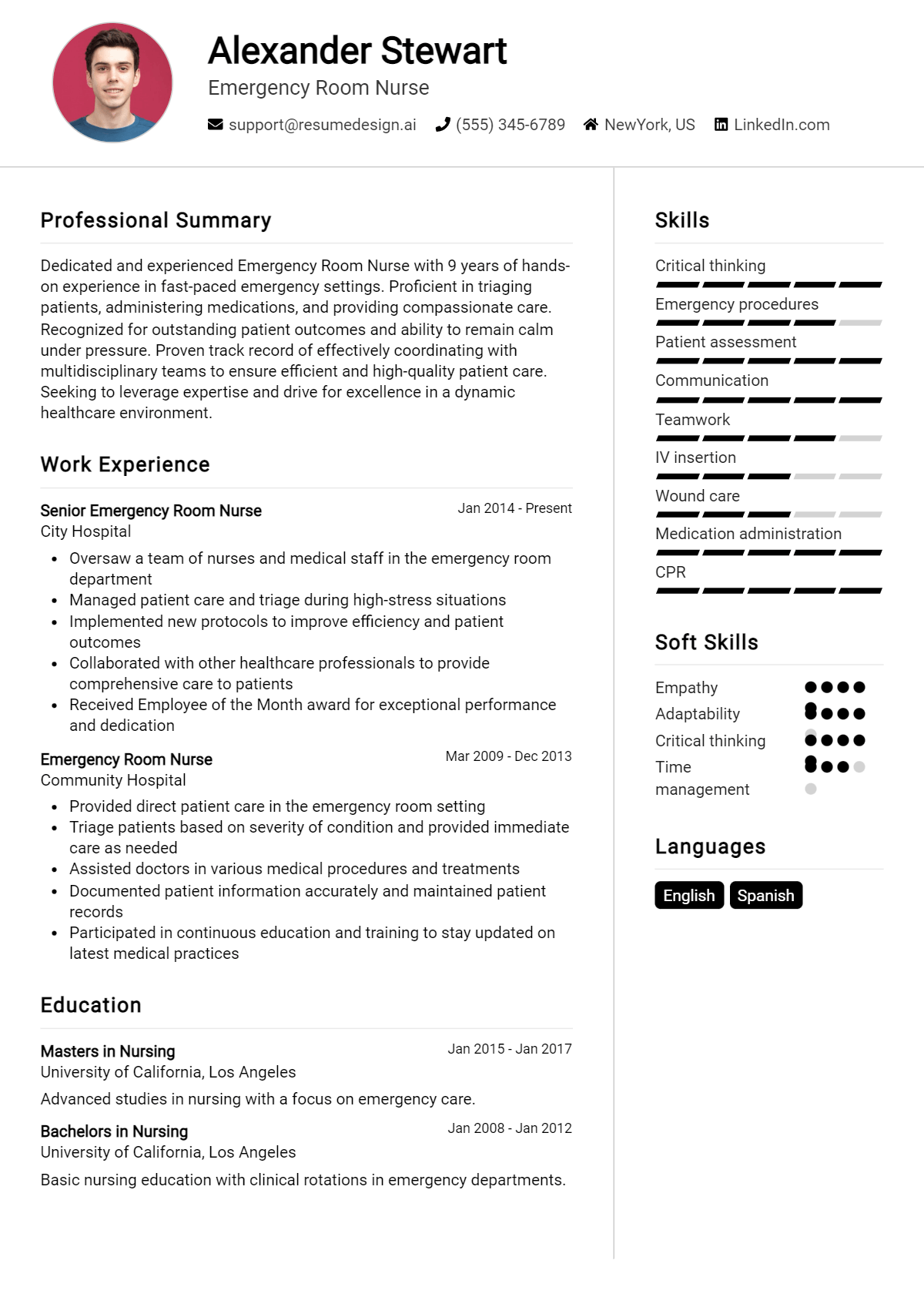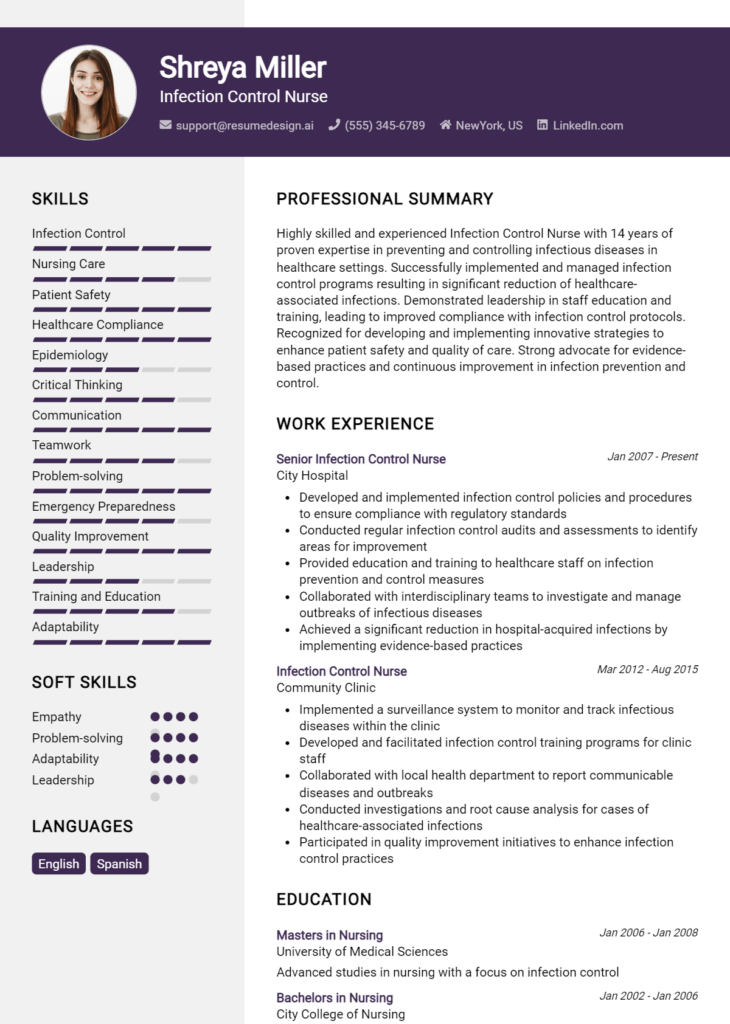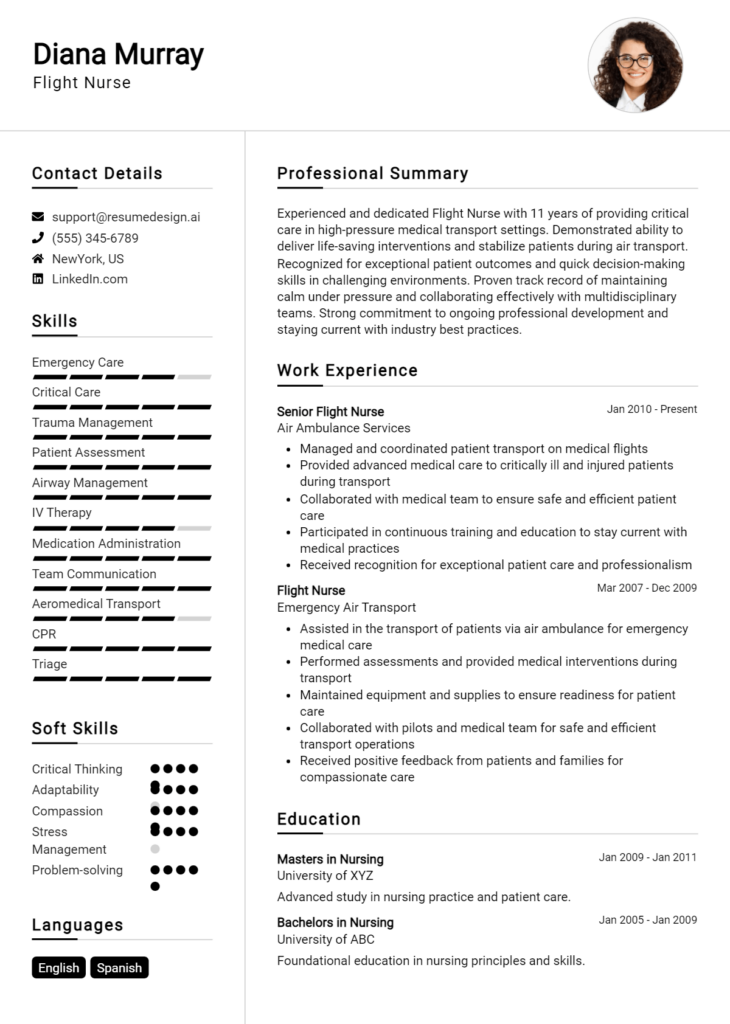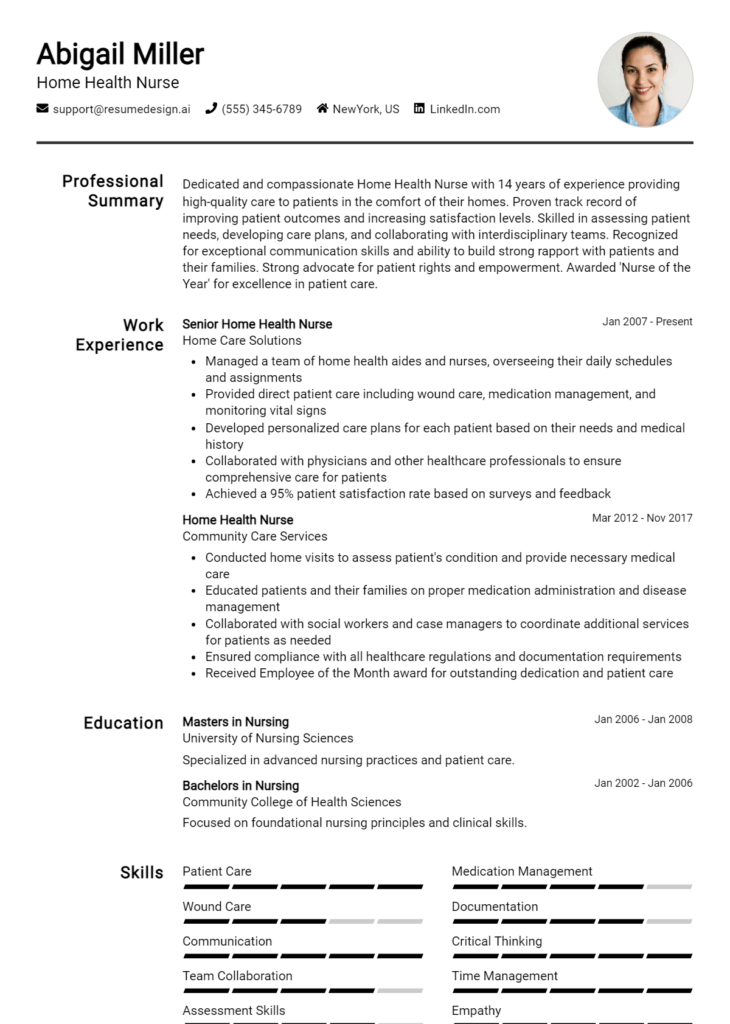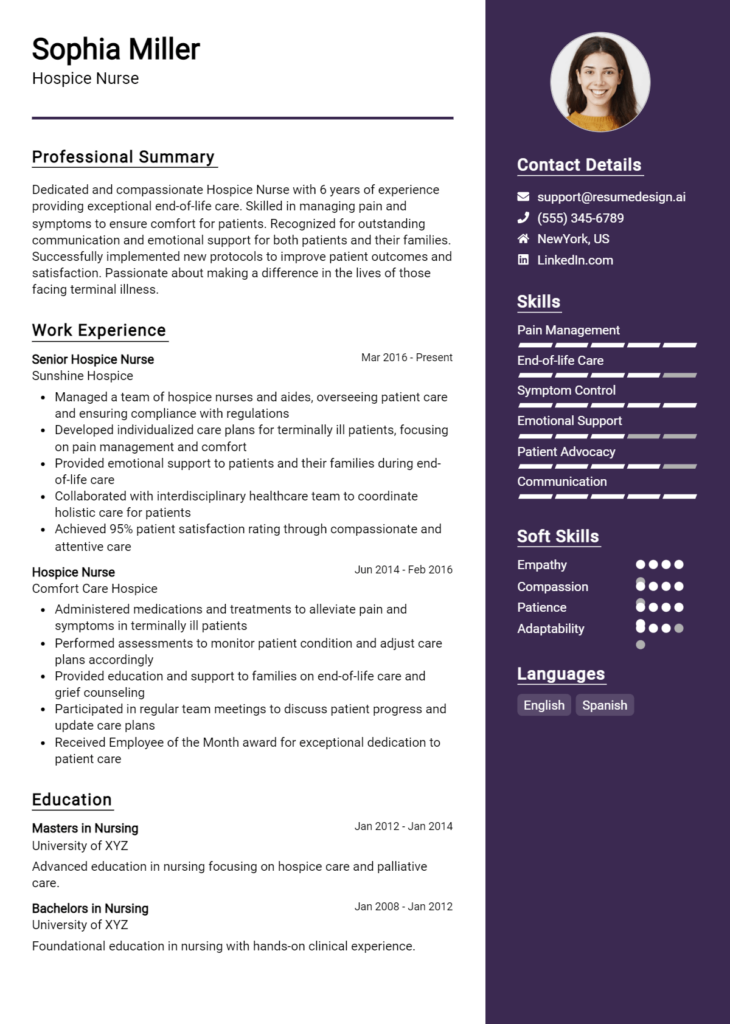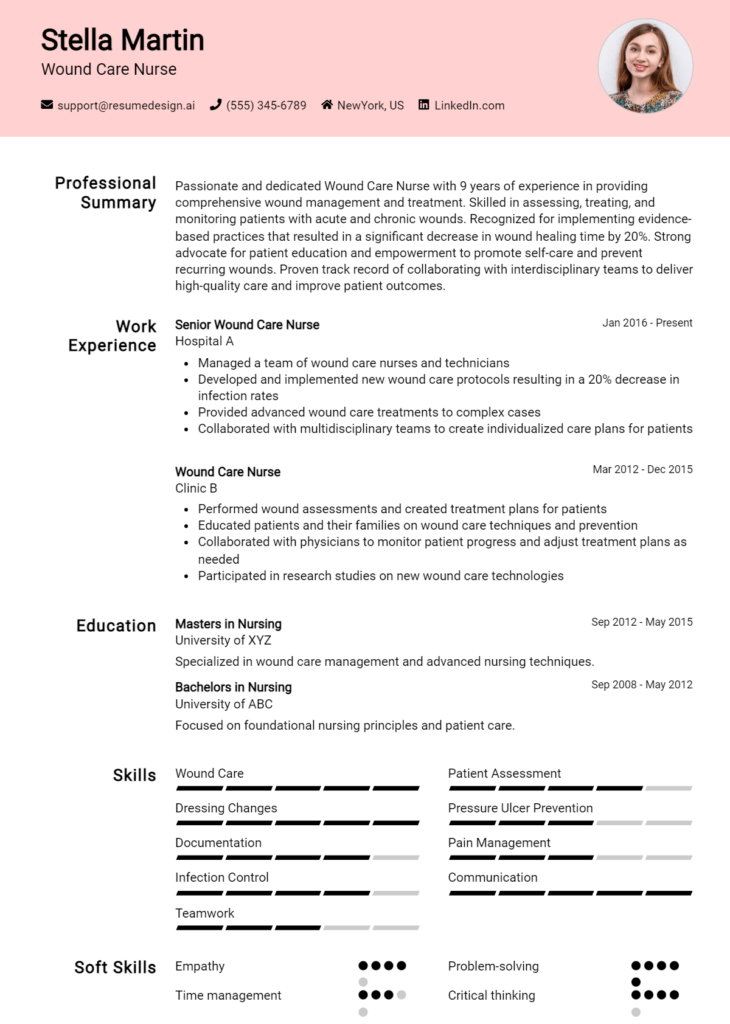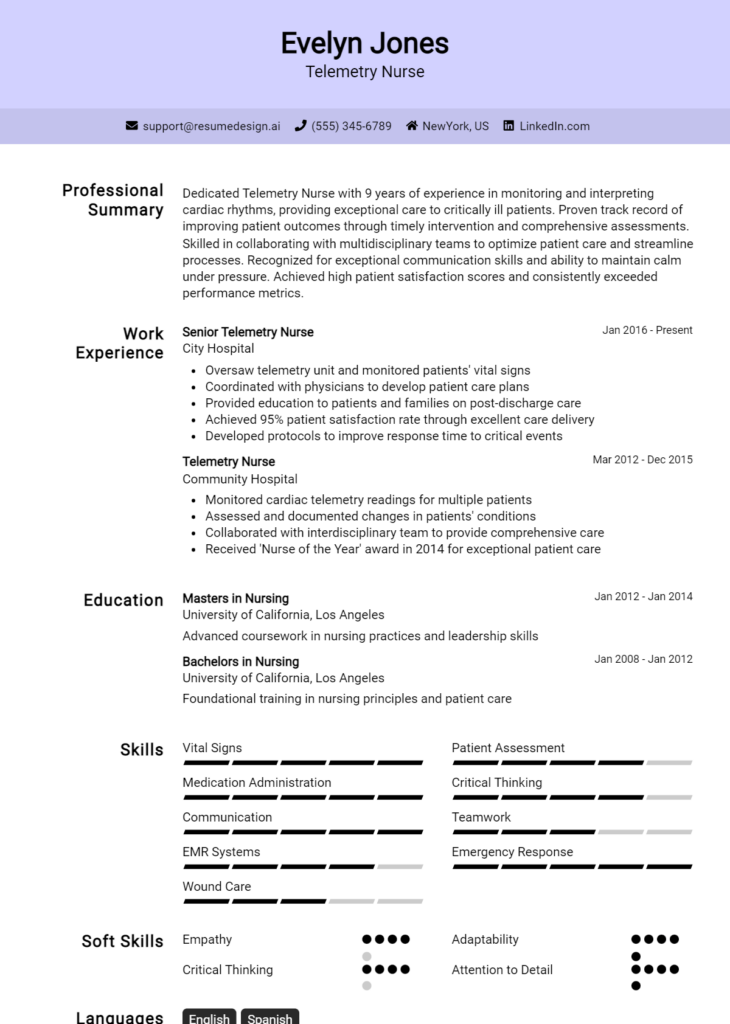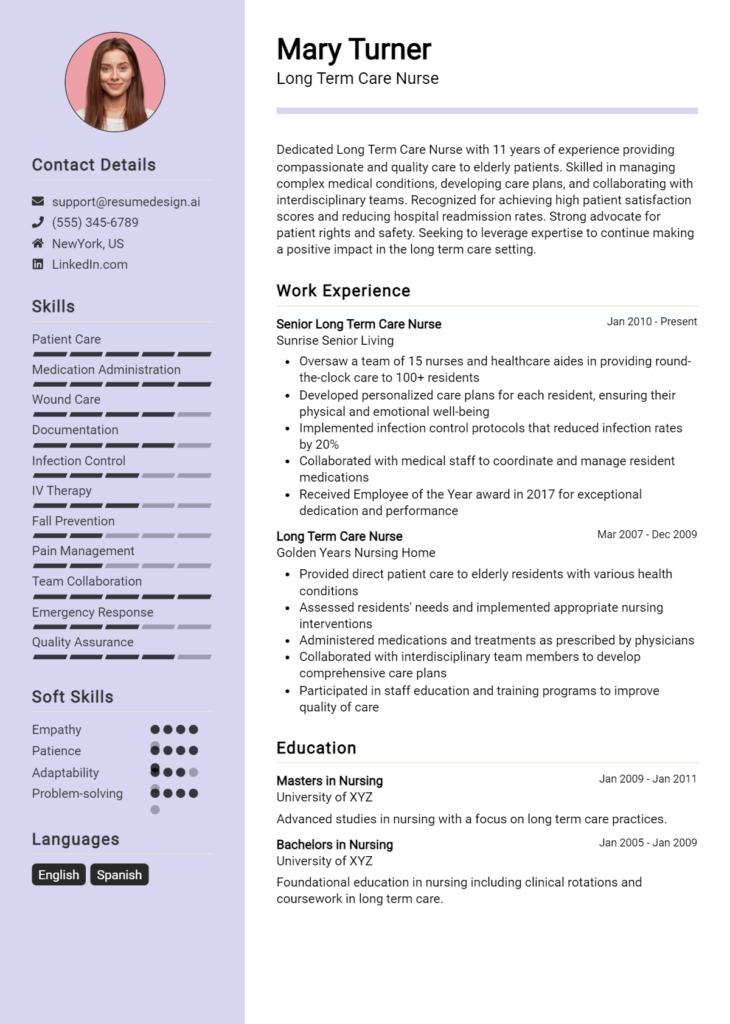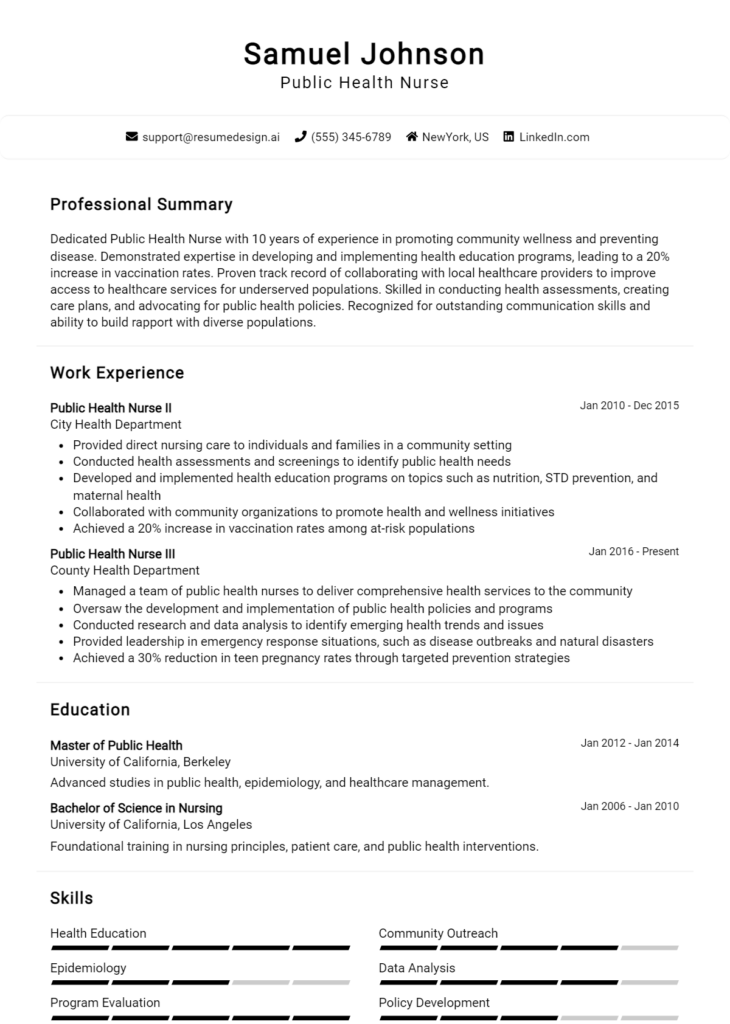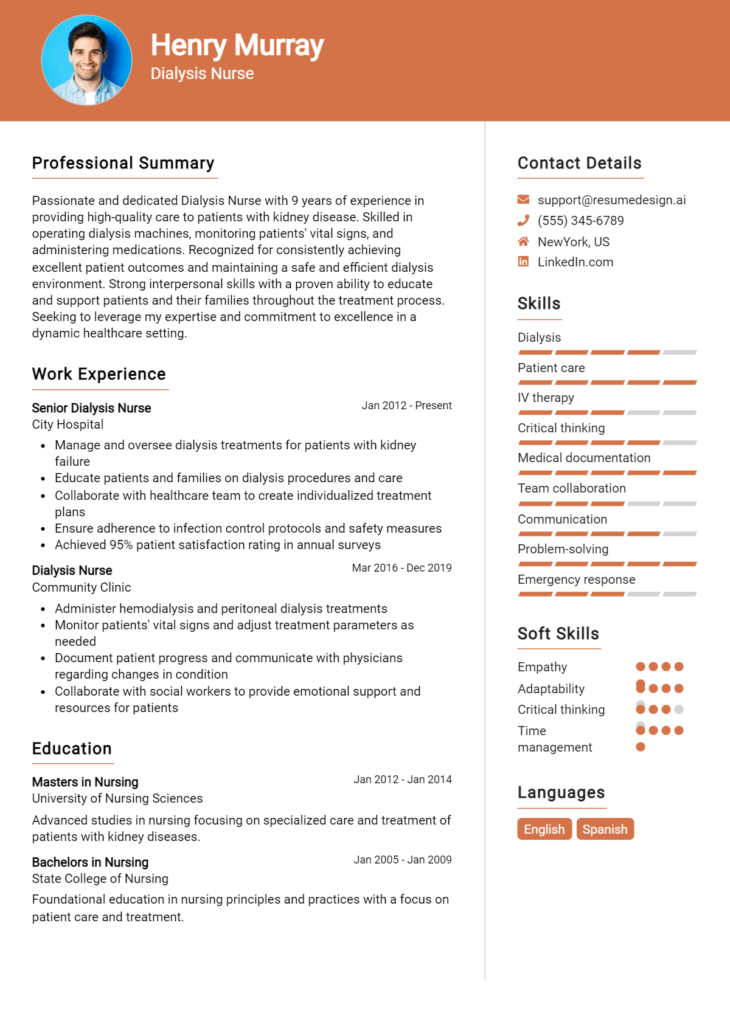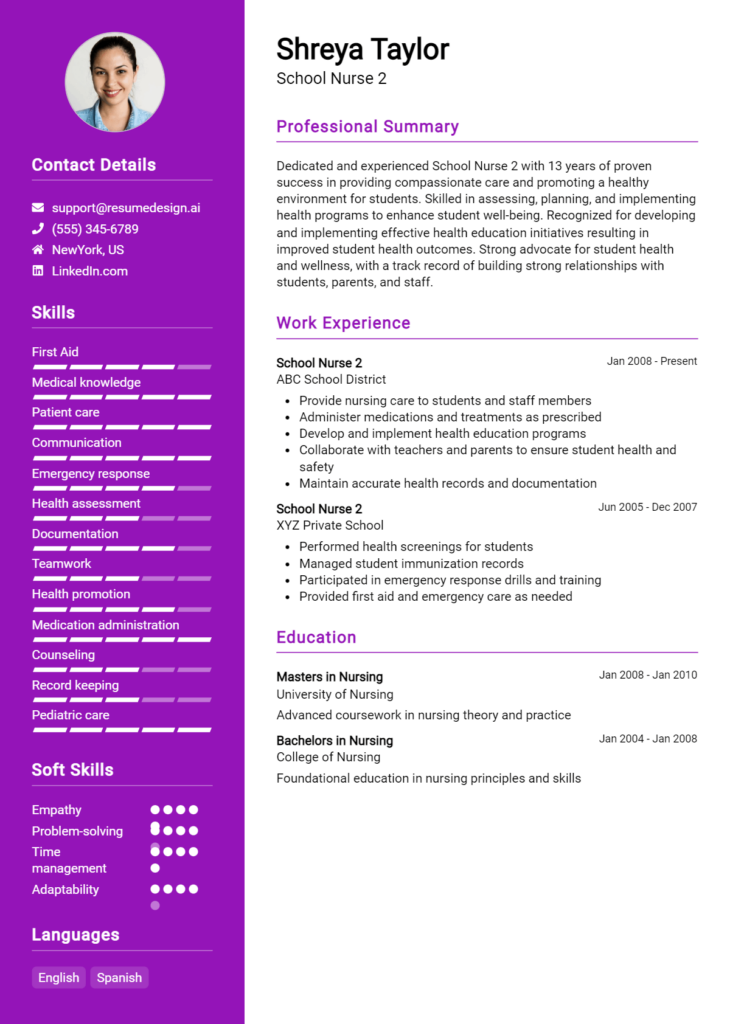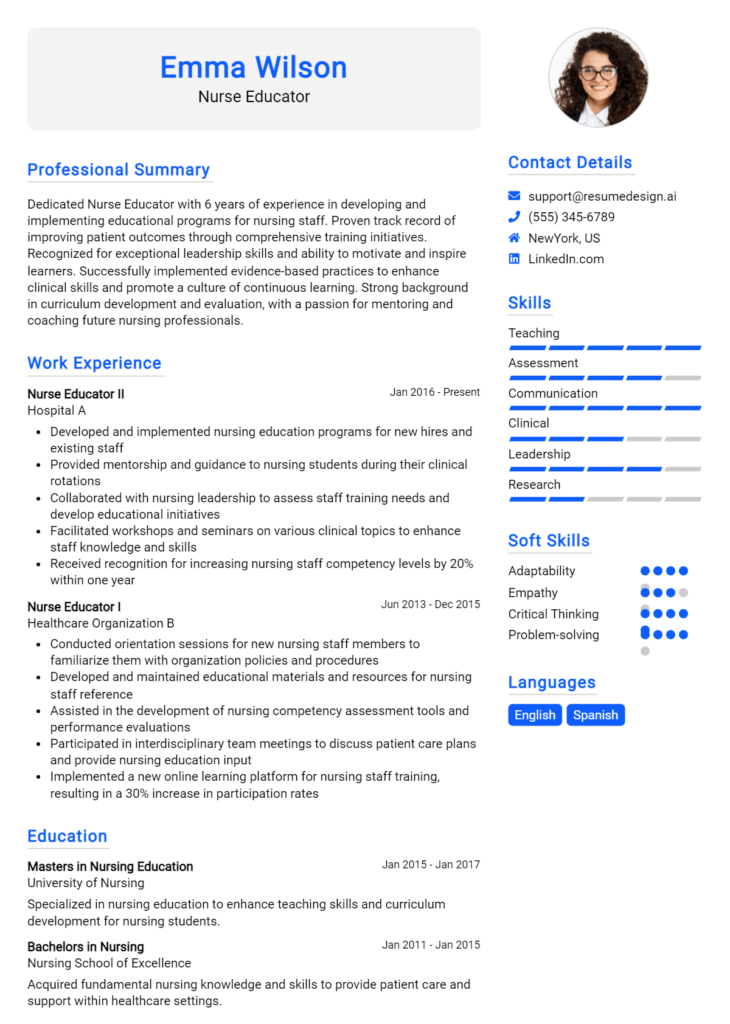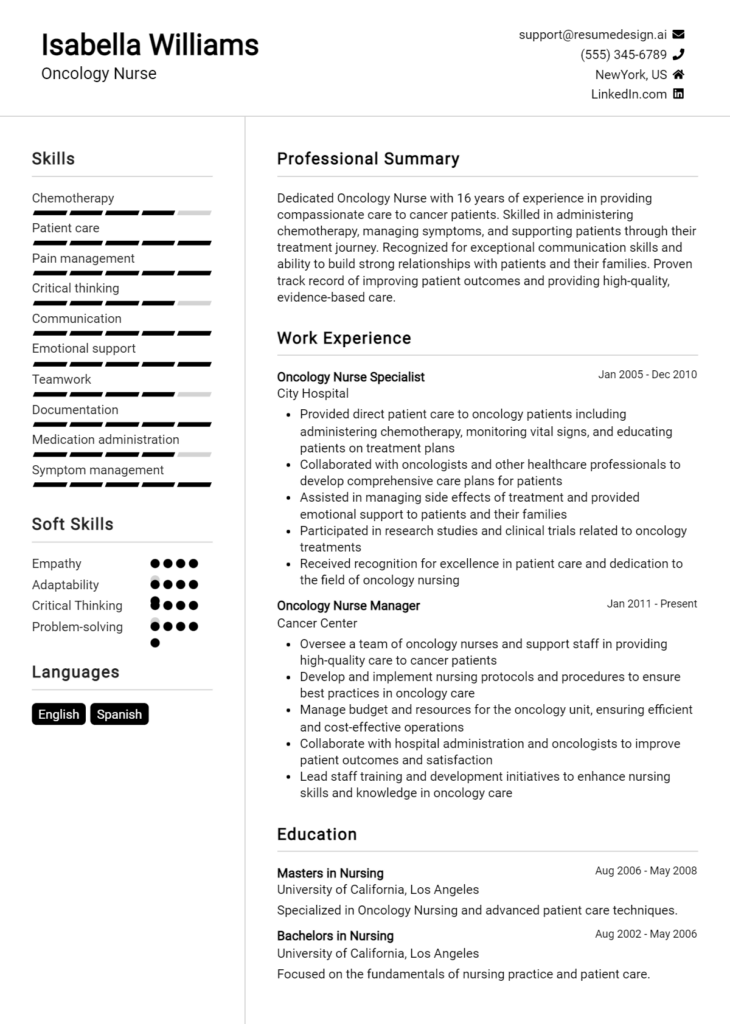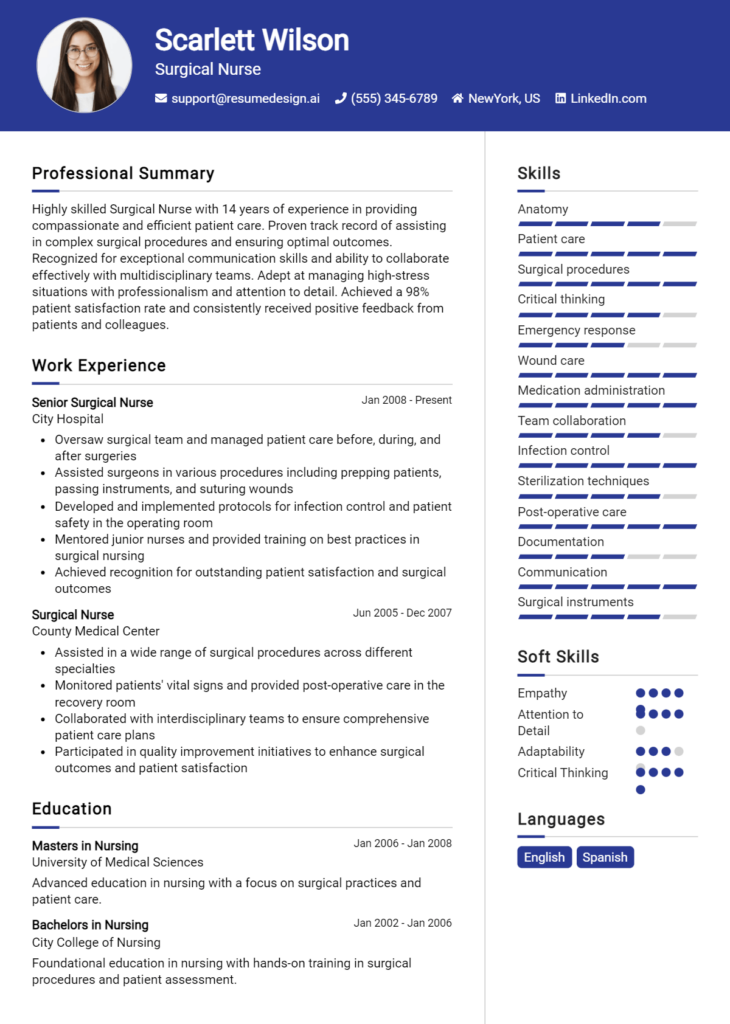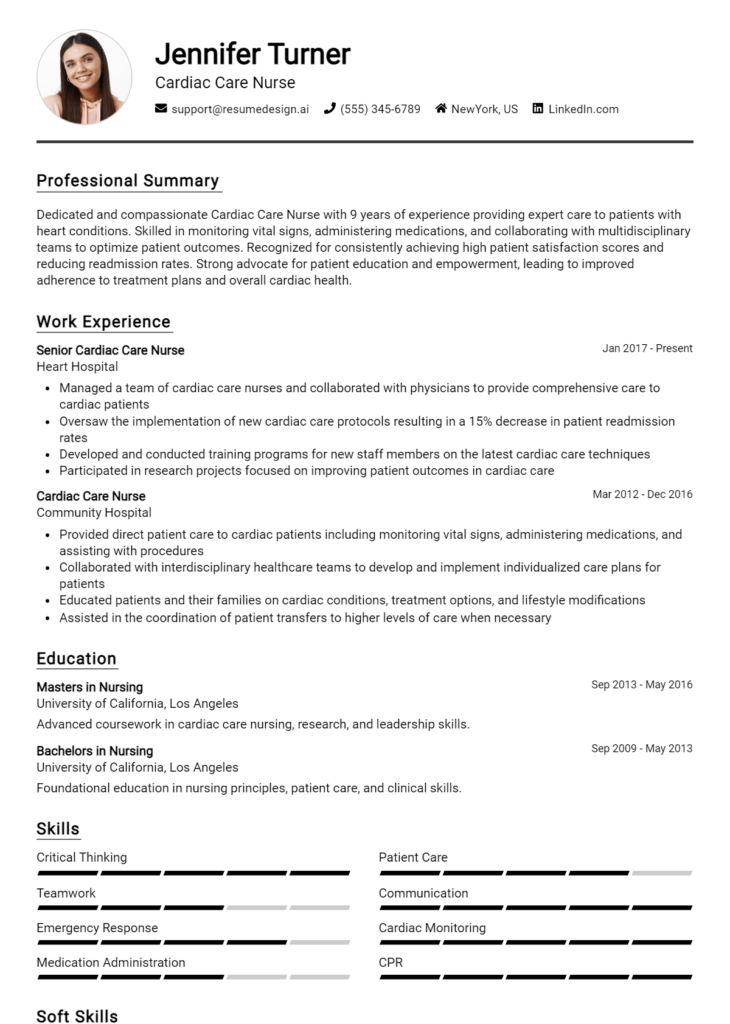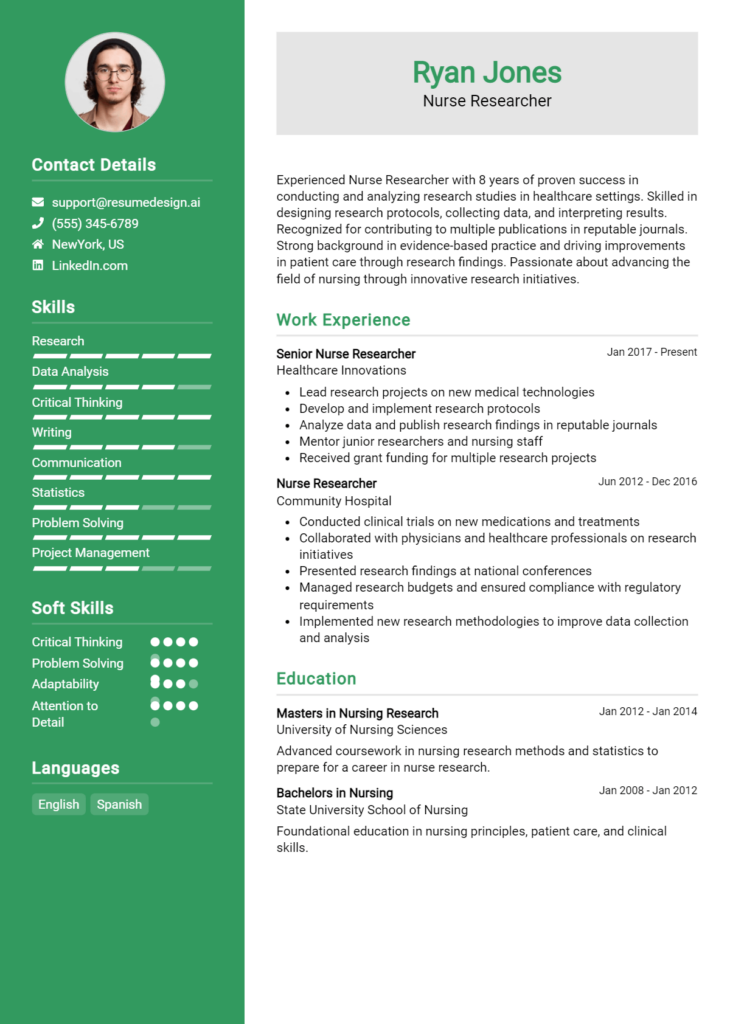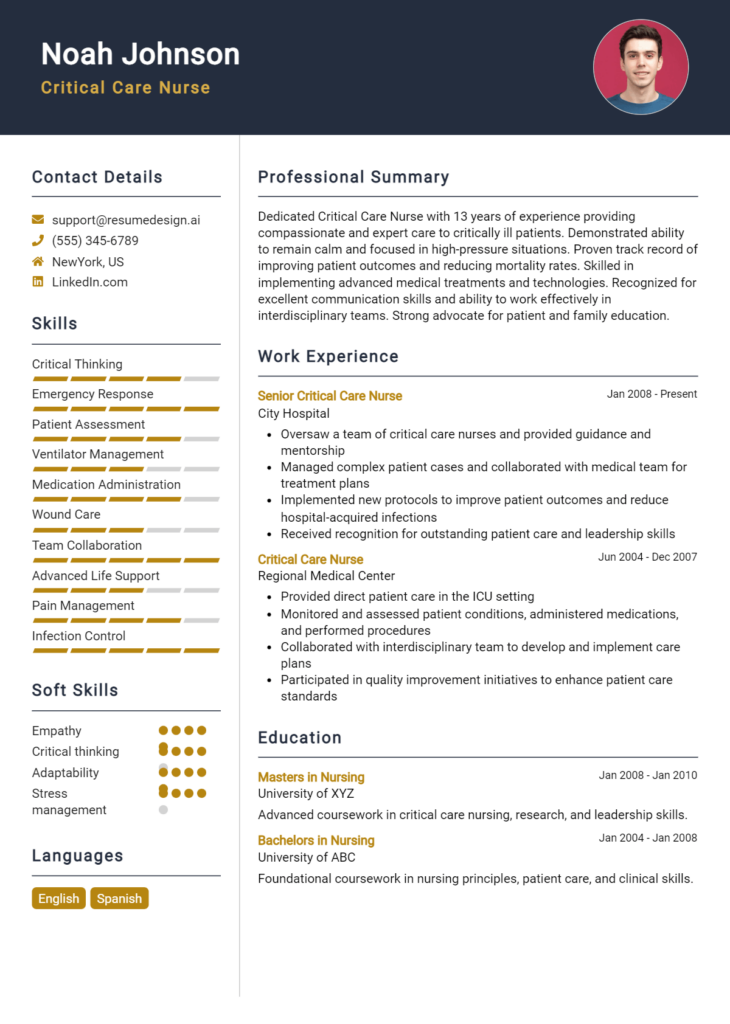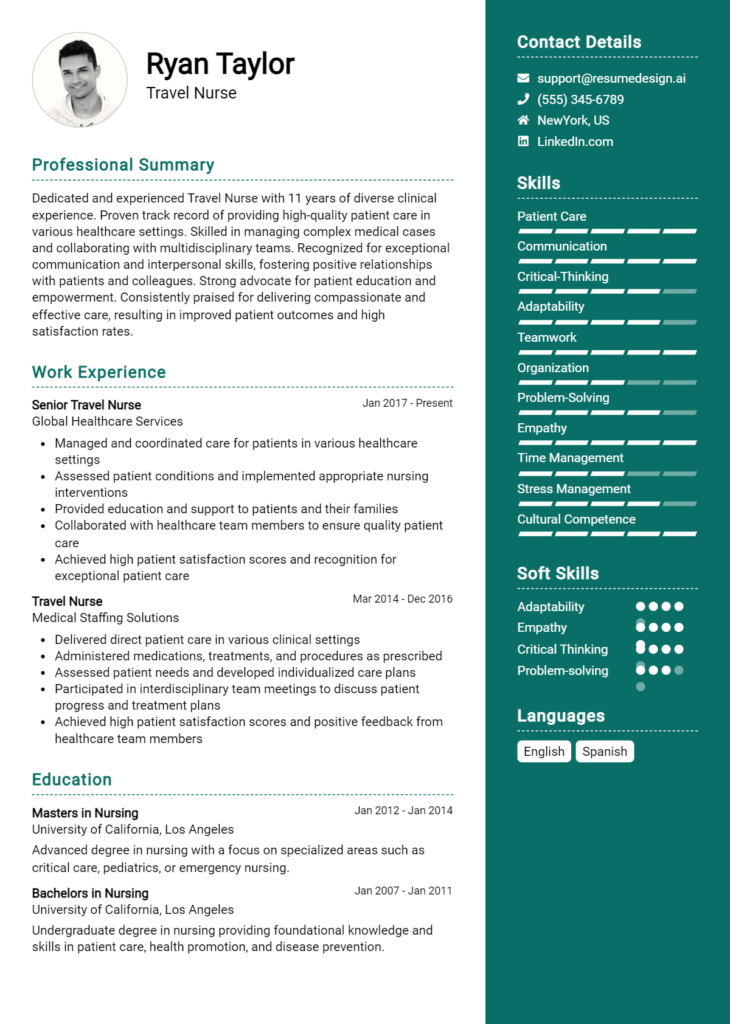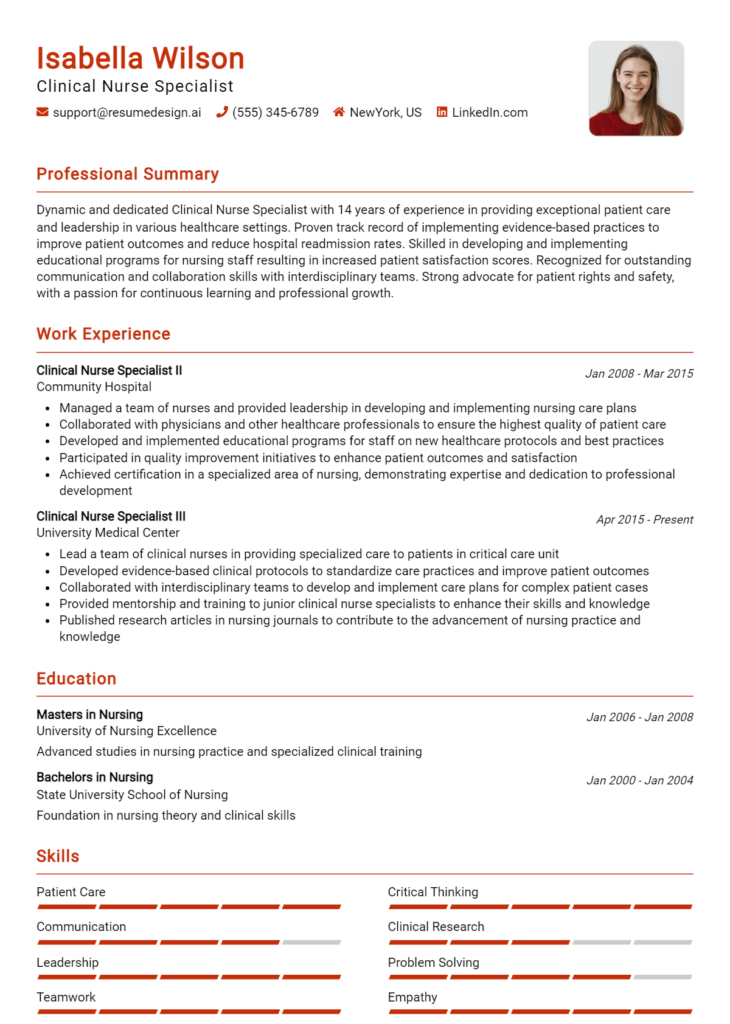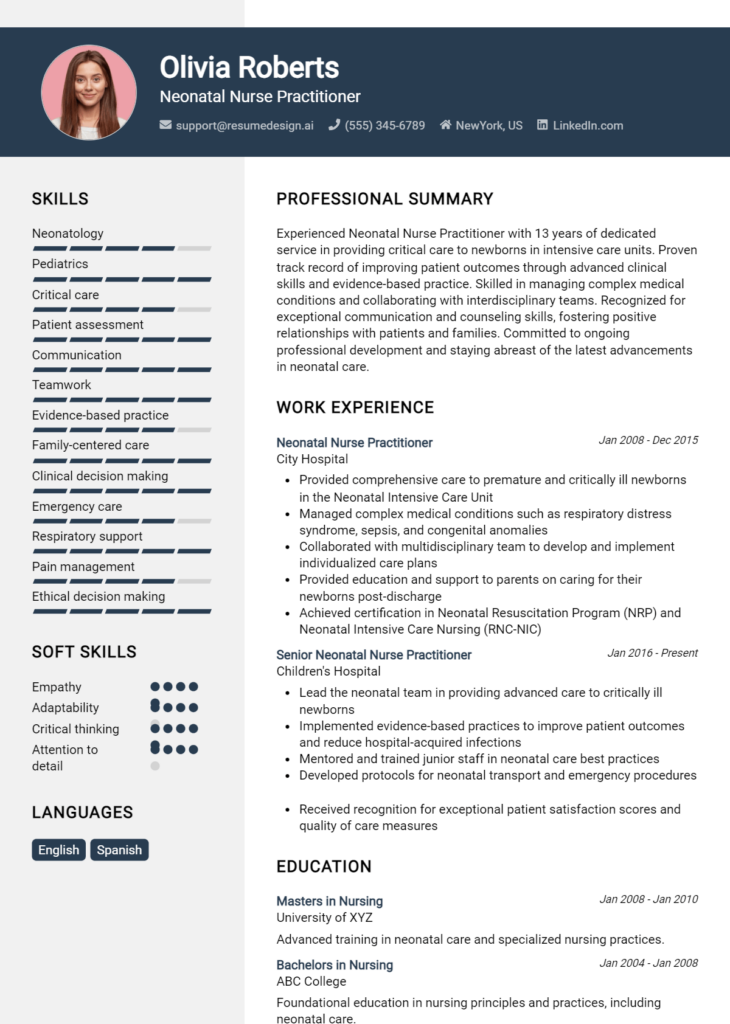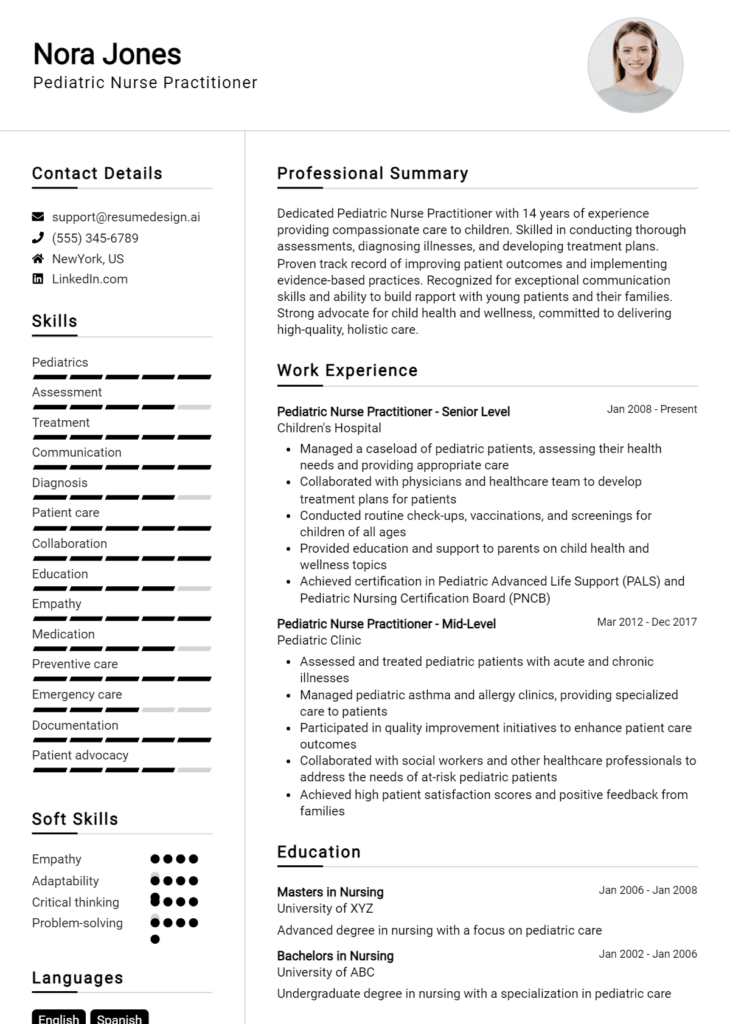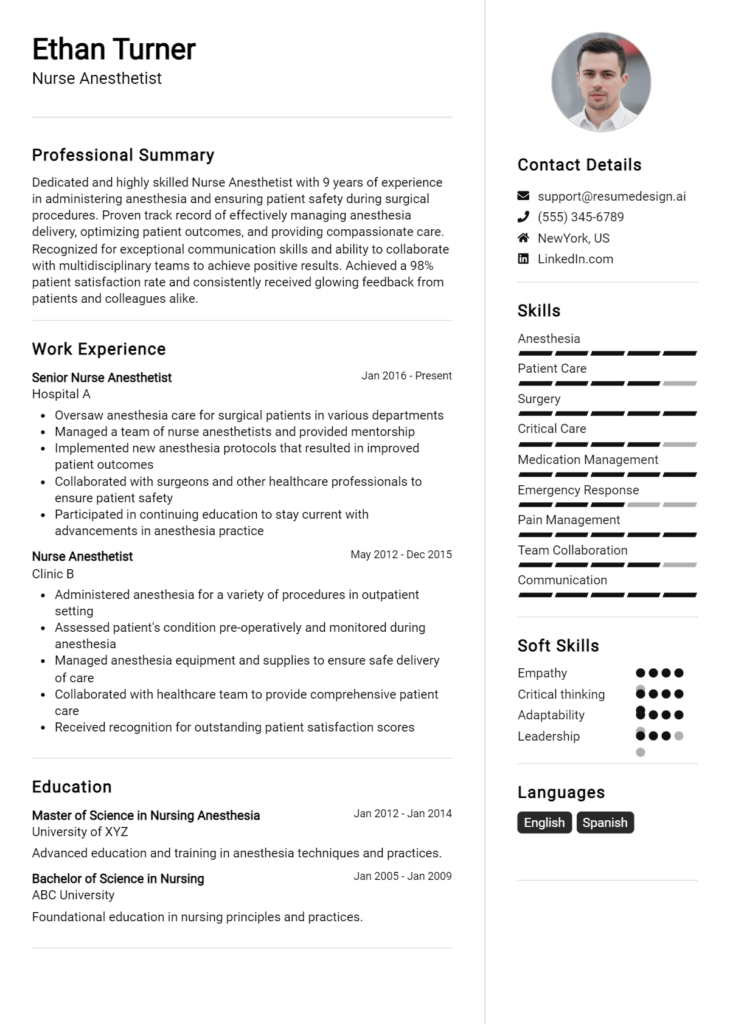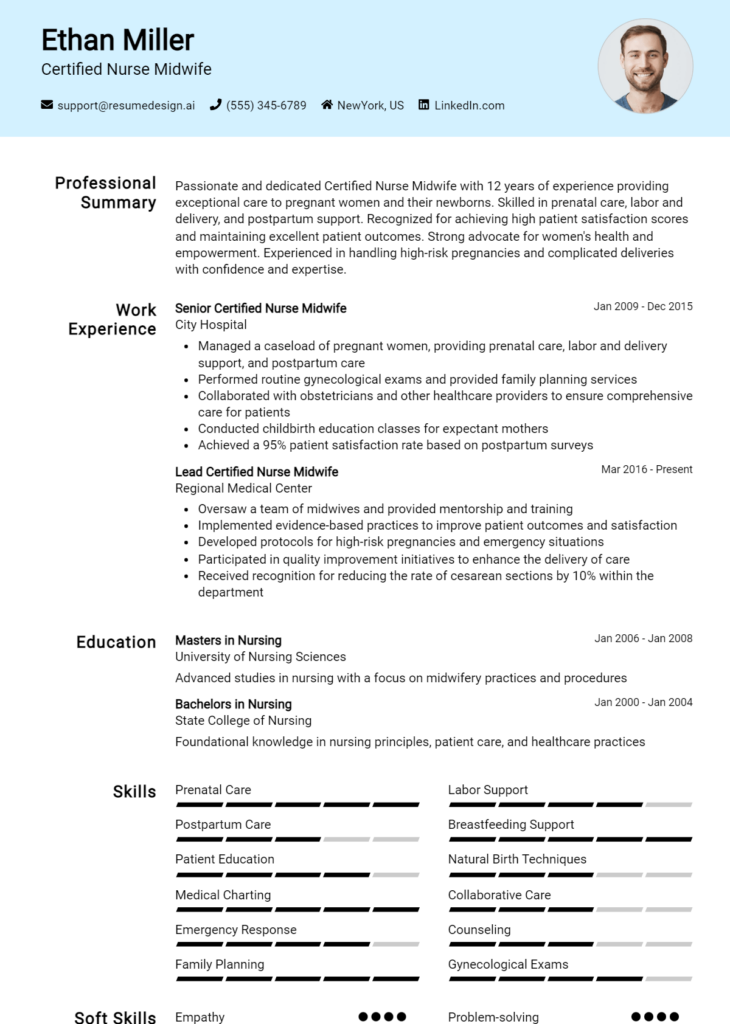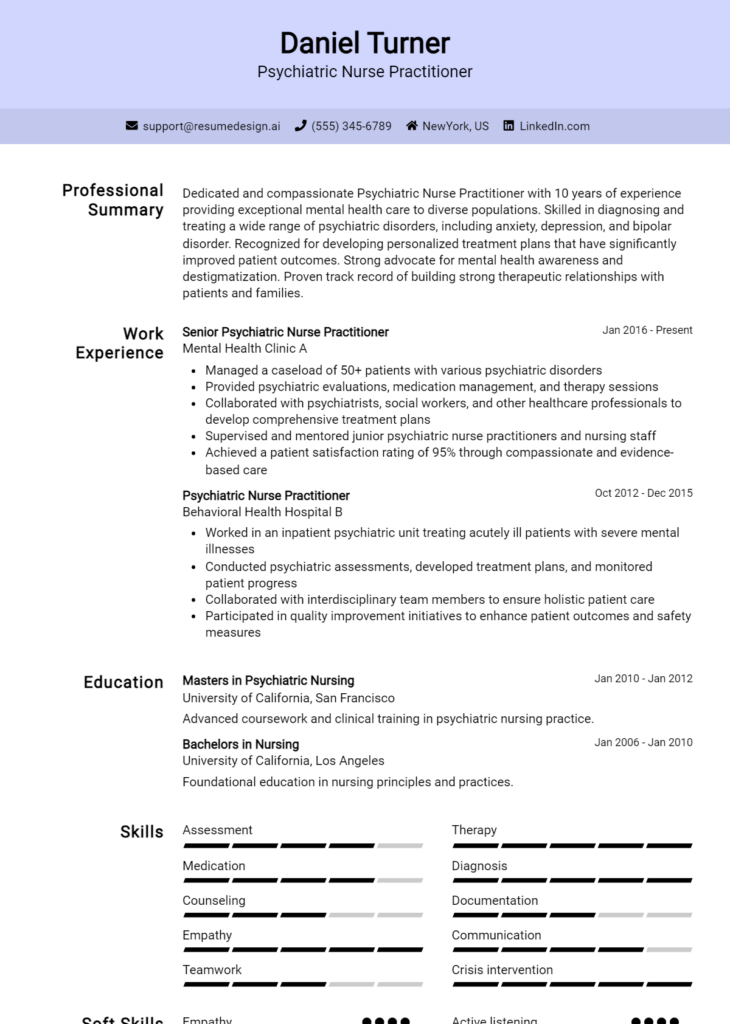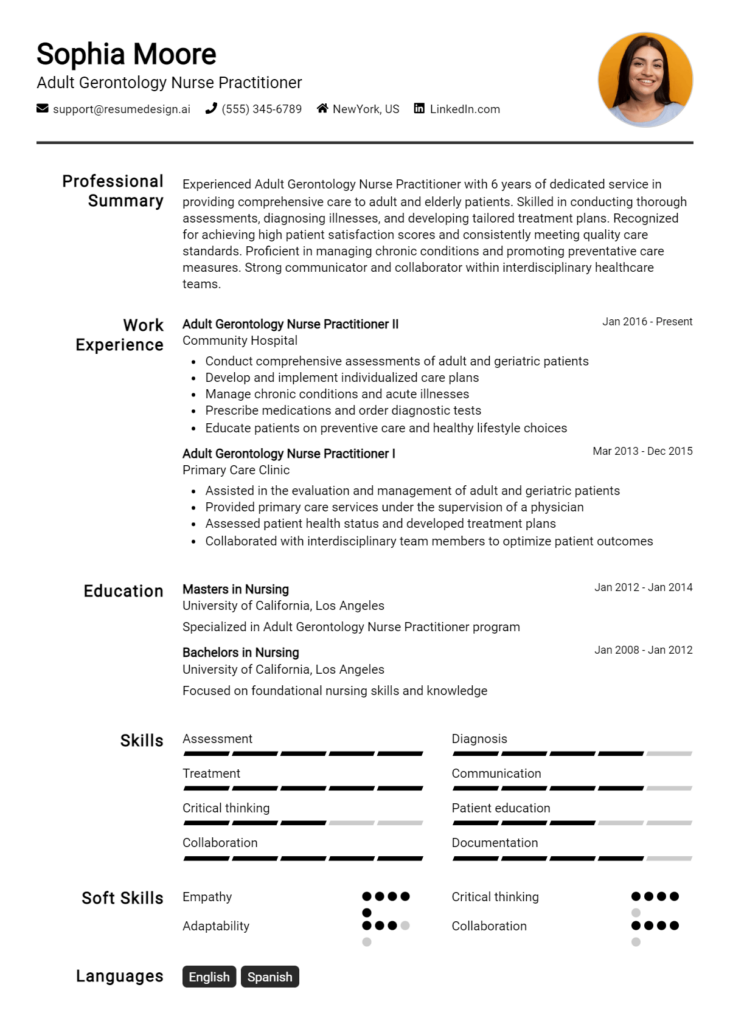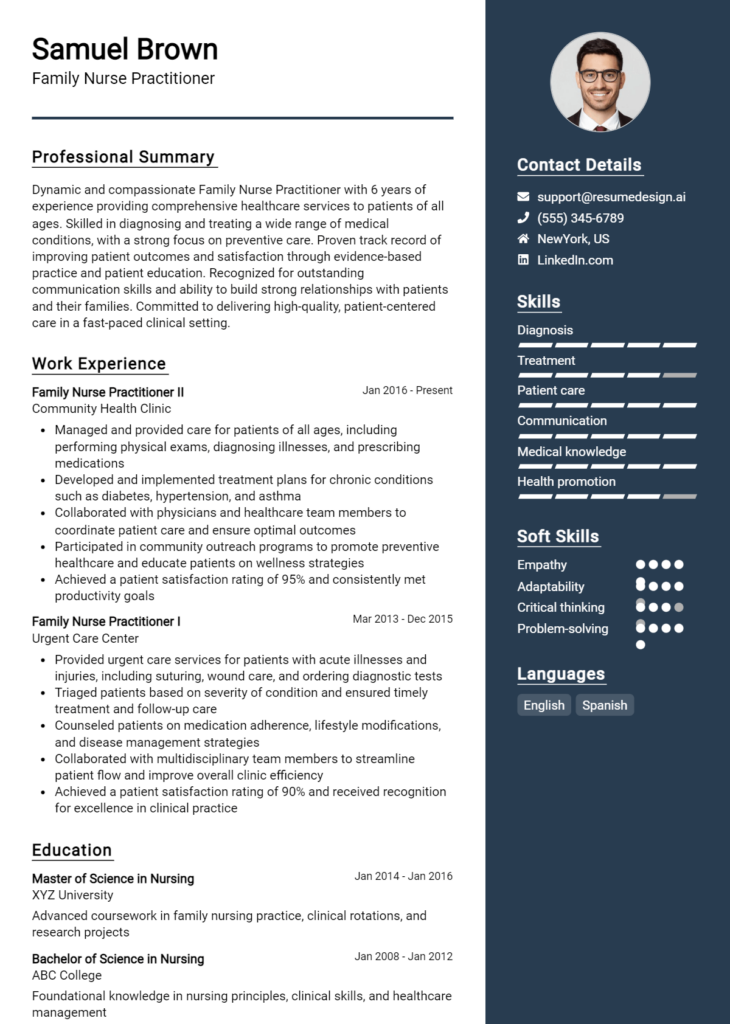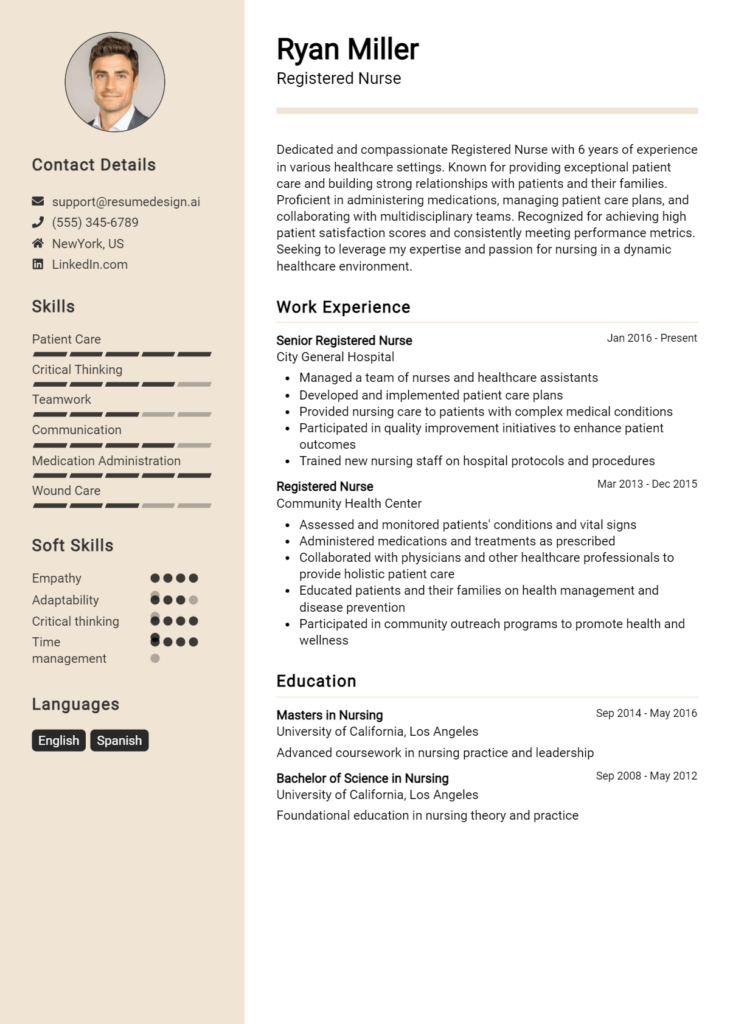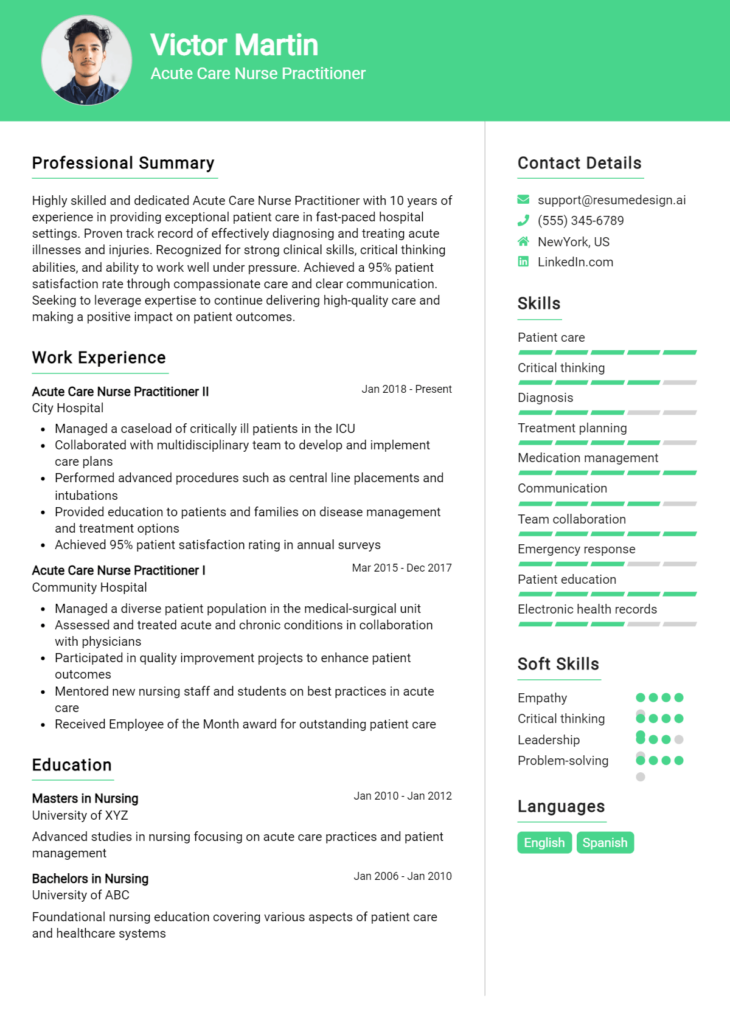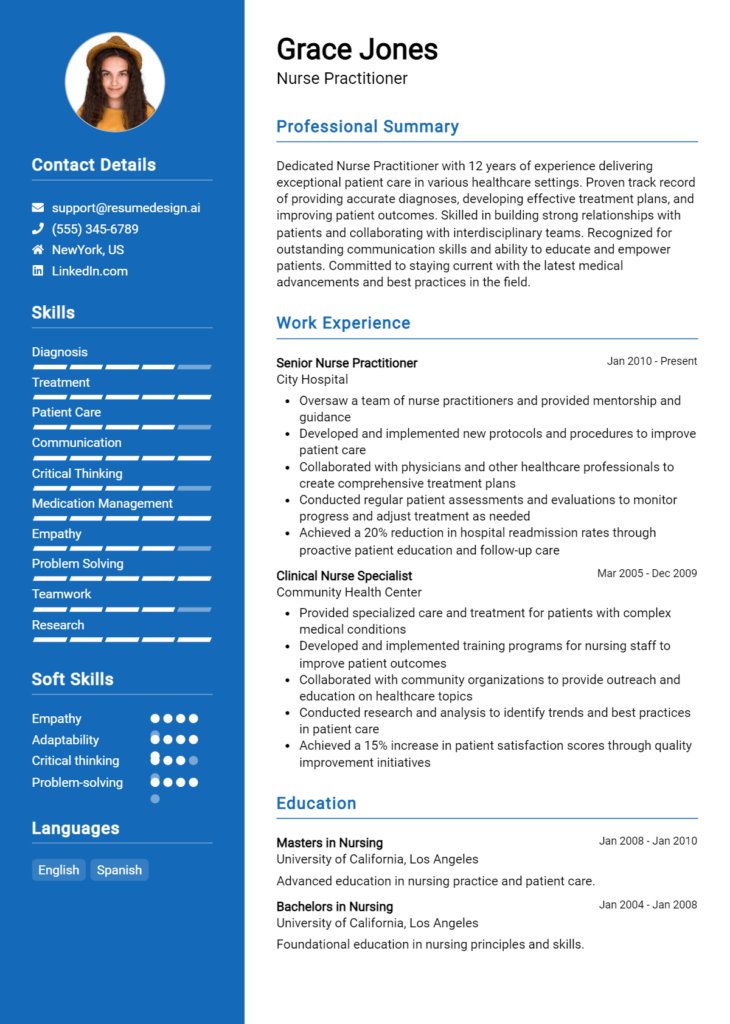Emergency Room Nurse Core Responsibilities
Emergency Room Nurses play a crucial role in delivering immediate care in high-pressure situations, bridging various departments such as triage, radiology, and surgery. They must possess strong technical skills, operational knowledge, and exceptional problem-solving abilities to assess patient conditions quickly and coordinate treatment plans effectively. These competencies not only enhance patient outcomes but also contribute to the organization's overarching goals of efficiency and quality care. A well-structured resume that highlights these qualifications can significantly enhance career opportunities in this demanding field.
Common Responsibilities Listed on Emergency Room Nurse Resume
- Performing initial assessments and triaging patients based on severity of condition.
- Administering medications and intravenous treatments as prescribed.
- Monitoring vital signs and managing emergency medical equipment.
- Collaborating with physicians and other healthcare professionals to develop treatment plans.
- Educating patients and families about care procedures and follow-up requirements.
- Documenting patient information and care provided in electronic health records.
- Responding to life-threatening situations with urgency and precision.
- Maintaining a sterile environment and adhering to infection control protocols.
- Providing emotional support to patients and their families during crises.
- Participating in continuous education and training to stay updated on best practices.
- Assisting in the training and orientation of new nursing staff.
- Coordinating with various departments for patient transfers and follow-up care.
High-Level Resume Tips for Emergency Room Nurse Professionals
In the competitive field of nursing, especially in high-stakes environments like the emergency room, a well-crafted resume can be the difference between landing an interview and being overlooked. Your resume is often the first impression you make on potential employers, and it needs to effectively showcase both your skills and achievements. As an Emergency Room Nurse professional, your resume should reflect your ability to thrive in fast-paced and high-pressure situations. This guide will provide practical and actionable resume tips specifically tailored for Emergency Room Nurse professionals, ensuring you stand out in a crowded applicant pool.
Top Resume Tips for Emergency Room Nurse Professionals
- Tailor your resume to the job description by incorporating relevant keywords and phrases that align with the specific requirements of the position.
- Highlight your nursing experience in emergency settings, emphasizing any roles in trauma centers, urgent care, or similar environments.
- Quantify your achievements by including specific metrics, such as the number of patients cared for, successful interventions, or improvements in patient outcomes.
- Showcase industry-specific skills such as triage, critical care, and emergency response protocols, ensuring these skills are prominently displayed.
- Include certifications that are relevant to emergency nursing, such as ACLS, PALS, or TNCC, to demonstrate your qualifications and commitment to ongoing education.
- Utilize a clean and professional format that enhances readability, ensuring that your most important information stands out.
- Incorporate a strong summary statement at the top of your resume that encapsulates your experience and passion for emergency nursing.
- List any specialized training or coursework that shows your commitment to the field and enhances your expertise.
- Don’t forget to mention soft skills such as communication, teamwork, and adaptability, which are crucial in emergency nursing.
- Proofread your resume multiple times to eliminate any errors or typos, as attention to detail is vital in the nursing profession.
By implementing these tips, you can significantly increase your chances of landing a job in the Emergency Room Nurse field. A well-structured and targeted resume not only showcases your qualifications but also communicates your readiness to tackle the challenges of emergency care, making you an appealing candidate to potential employers.
Why Resume Headlines & Titles are Important for Emergency Room Nurse
In the competitive landscape of healthcare, particularly in emergency room settings, a well-crafted resume headline or title can serve as a powerful first impression for hiring managers. This crucial element provides a snapshot of a candidate's key qualifications and expertise, allowing them to quickly assess the applicant's suitability for the role. A strong headline should be concise, relevant, and directly related to the position being applied for, effectively summarizing the candidate's skills and experience in an impactful phrase. By grabbing the attention of hiring managers, a compelling headline can increase the likelihood of the resume being reviewed in detail, ultimately enhancing the candidate's chances of landing an interview.
Best Practices for Crafting Resume Headlines for Emergency Room Nurse
- Keep it concise: Aim for one impactful phrase that captures your qualifications.
- Be role-specific: Tailor your headline to reflect the emergency room nursing position you are applying for.
- Highlight key strengths: Include your most relevant skills or achievements to demonstrate your value.
- Avoid jargon: Use clear and straightforward language that can be easily understood by hiring managers.
- Incorporate keywords: Use industry-specific terms that align with the job description to improve visibility.
- Showcase certifications: Mention any relevant certifications or specializations that set you apart.
- Use action words: Start with dynamic verbs that convey your proactive approach to nursing.
- Maintain professionalism: Ensure the tone is formal and aligns with the expectations of the healthcare field.
Example Resume Headlines for Emergency Room Nurse
Strong Resume Headlines
Compassionate Emergency Room Nurse with 5+ Years of Experience in High-Pressure Environments
Dedicated RN Specializing in Trauma Care and Patient Stabilization
Skilled Emergency Room Nurse with Advanced Certification in ACLS and PALS
Dynamic ER Nurse Known for Rapid Patient Assessment and Critical Care Expertise
Weak Resume Headlines
Nurse Looking for Job
Experienced Nurse
Healthcare Professional
The strong headlines are effective because they convey specific skills, experiences, and qualifications that are relevant to the emergency room nursing role, capturing the essence of what hiring managers are seeking. In contrast, the weak headlines fail to impress due to their vagueness and lack of detail, making it difficult for hiring managers to glean any meaningful information about the candidate's suitability for the position. By focusing on the unique strengths and qualifications of an emergency room nurse, strong headlines can significantly enhance the overall impact of a resume.
Writing an Exceptional Emergency Room Nurse Resume Summary
In the competitive field of healthcare, a well-crafted resume summary for an Emergency Room Nurse is vital for making a lasting impression on hiring managers. This brief but impactful section provides a snapshot of your qualifications, showcasing key skills, relevant experience, and notable accomplishments that align with the demands of the role. A strong resume summary not only grabs the attention of employers but also sets the tone for the rest of the resume, making it imperative to keep it concise and tailored to each specific job application.
Best Practices for Writing a Emergency Room Nurse Resume Summary
- Quantify Achievements: Use numbers to highlight your impact, such as patient outcomes, efficiency improvements, or volume of patients handled.
- Focus on Skills: Emphasize critical skills such as triage, patient assessment, and crisis management that are essential in an emergency room setting.
- Tailor for the Job Description: Customize your summary to reflect the specific requirements and keywords mentioned in the job posting.
- Keep it Concise: Aim for 2-4 sentences that effectively summarize your qualifications without going into excessive detail.
- Highlight Relevant Experience: Include specific past roles or situations that demonstrate your ability to thrive in high-pressure environments.
- Showcase Certifications: Mention any relevant certifications, such as BLS, ACLS, or PALS, to reinforce your qualifications.
- Use Action-Oriented Language: Start with strong action verbs to convey your proactive approach and dedication to patient care.
- Maintain Professional Tone: Use clear and professional language that reflects your expertise and seriousness about the role.
Example Emergency Room Nurse Resume Summaries
Strong Resume Summaries
Compassionate and detail-oriented Emergency Room Nurse with over 5 years of experience in fast-paced hospital settings. Successfully managed a caseload of up to 20 patients per shift, resulting in a 15% improvement in patient satisfaction scores through effective communication and timely interventions.
Dedicated Emergency Room Nurse with a proven track record of excellence in triage and patient assessment. Certified in ACLS and BLS, I have effectively reduced wait times by 30% through streamlined processes and collaborative team efforts.
Skilled Emergency Room Nurse adept at delivering high-quality care in critical situations. Experienced in handling trauma cases with a 98% success rate in stabilizing patients pre-transport, ensuring optimal outcomes in emergency medical situations.
Weak Resume Summaries
I am a nurse with experience in the emergency room. I work well with patients and have some certifications.
Emergency Room Nurse looking for a new opportunity. I have skills in patient care and teamwork.
The strong examples illustrate the candidate's relevant experience, quantifiable results, and specific skills that align with the demands of an Emergency Room Nurse role. They are concise yet impactful, effectively showcasing the nurse's qualifications. Conversely, the weak summaries lack detail and specificity, making them appear generic and unremarkable. They fail to convey the candidate's unique contributions or achievements, which diminishes their appeal to hiring managers.
Work Experience Section for Emergency Room Nurse Resume
The work experience section of an Emergency Room Nurse resume is critical as it provides a comprehensive overview of the candidate's professional journey, showcasing their technical skills and ability to manage high-pressure situations effectively. This section not only highlights the nurse's clinical expertise but also emphasizes their role in team collaboration and their commitment to delivering high-quality patient care. By quantifying achievements and aligning experiences with industry standards, candidates can demonstrate their impact in previous roles, making it easier for potential employers to assess their capabilities and fit for the position.
Best Practices for Emergency Room Nurse Work Experience
- Clearly outline responsibilities and achievements in previous roles.
- Use quantifiable results to demonstrate the impact of your work (e.g., reduced patient wait times by 20%).
- Highlight specific technical skills and certifications relevant to emergency care.
- Emphasize collaboration with multidisciplinary teams in patient care.
- Include leadership roles or initiatives taken that improved departmental efficiency.
- Tailor your experiences to align with the job description and expectations of the role.
Example Work Experiences for Emergency Room Nurse
Strong Experiences
- Led a team of nurses in implementing a new triage protocol, resulting in a 30% decrease in patient wait times and improved patient satisfaction scores.
- Administered emergency medications and interventions to over 150 patients monthly, achieving a 95% success rate in stabilizing critical cases.
- Collaborated with physicians and specialists to develop individualized care plans, enhancing treatment effectiveness and reducing hospital readmission rates by 15%.
Weak Experiences
- Assisted in patient care and performed various tasks in the emergency room.
- Worked with other nurses and doctors on several cases.
- Participated in training sessions and learned new procedures.
The examples listed as strong experiences stand out because they provide clear, quantifiable outcomes and demonstrate active leadership and collaboration in patient care. They offer specific metrics and articulate the impact of the nurse's contributions, making them compelling. In contrast, the weak experiences lack detail and fail to convey the candidate's achievements or the significance of their roles, making them less impactful to potential employers.
Education and Certifications Section for Emergency Room Nurse Resume
The education and certifications section of an Emergency Room Nurse resume is crucial as it showcases the candidate's academic background and professional qualifications. This section serves as a testament to the nurse's commitment to their profession, highlighting not only their foundational education but also any industry-relevant certifications and ongoing learning efforts. By including relevant coursework, certifications, and specialized training, candidates can significantly enhance their credibility and demonstrate their alignment with the job role, ultimately making them more attractive to potential employers.
Best Practices for Emergency Room Nurse Education and Certifications
- Prioritize relevant education, such as an Associate's or Bachelor's degree in Nursing.
- List certifications that are recognized in the industry, such as ACLS, BLS, or TNCC.
- Include any specialized training or workshops that pertain to emergency care.
- Provide details of relevant coursework that supports the skills needed in an ER setting.
- Highlight advanced certifications or credentials that showcase expertise, such as Certified Emergency Nurse (CEN).
- Keep the format clear and organized for easy reading, using bullet points or separate sections.
- Regularly update this section with any new qualifications or certifications obtained.
- Use specific titles and dates to provide context and credibility to your educational achievements.
Example Education and Certifications for Emergency Room Nurse
Strong Examples
- Bachelor of Science in Nursing (BSN), University of Health Sciences, Graduated May 2021
- Certified Emergency Nurse (CEN), Emergency Nurses Association, Certification Date: June 2022
- Advanced Cardiovascular Life Support (ACLS), American Heart Association, Certification Date: March 2023
- Trauma Nursing Core Course (TNCC), Emergency Nurses Association, Certification Date: January 2023
Weak Examples
- Associate Degree in General Studies, Community College, Graduated December 2019
- Certification in Basic Life Support (BLS), Expired July 2021
- Coursework in Psychology and Sociology, Not directly related to nursing
- Nursing Assistant Certification from 2015, No longer relevant or recognized
The strong examples are considered effective because they directly align with the requirements and expectations of an Emergency Room Nurse, showcasing relevant degrees and current certifications that demonstrate the candidate's competency in emergency medicine. In contrast, the weak examples are ineffective as they feature outdated, irrelevant, or non-specific qualifications that do not support the candidate's suitability for the role, potentially undermining their application.
Top Skills & Keywords for Emergency Room Nurse Resume
In the fast-paced environment of an emergency room, the role of a nurse is critical, requiring a unique blend of skills to ensure patient safety and effective care. An Emergency Room Nurse must not only possess clinical knowledge and technical expertise but also exhibit key interpersonal abilities that can significantly impact patient outcomes. When crafting a resume for this vital role, it is essential to highlight both hard and soft skills that demonstrate your readiness to handle the challenges of emergency care. Skills are the cornerstone of a strong resume, providing potential employers with a clear picture of your qualifications and fit for the position.
Top Hard & Soft Skills for Emergency Room Nurse
Soft Skills
- Excellent communication skills
- Strong emotional resilience
- Critical thinking and problem-solving
- Teamwork and collaboration
- Adaptability in high-pressure situations
- Empathy and compassion
- Attention to detail
- Time management
- Conflict resolution
- Patient advocacy
Hard Skills
- Advanced Cardiac Life Support (ACLS) certification
- Pediatric Advanced Life Support (PALS) certification
- Trauma nursing skills
- Proficiency in electronic health records (EHR)
- Knowledge of medical terminology
- IV administration and phlebotomy
- Wound care and management
- Basic life support (BLS) certification
- Familiarity with medical equipment and technology
- Risk assessment and triage skills
By showcasing these skills and aligning them with your work experience, you can create a compelling resume that stands out to hiring managers in the competitive field of emergency medicine.
Stand Out with a Winning Emergency Room Nurse Cover Letter
Dear Hiring Manager,
I am writing to express my enthusiasm for the Emergency Room Nurse position at [Hospital Name] as advertised on [Job Board/Website]. With over [X years] of experience in fast-paced emergency settings and a solid foundation in critical care nursing, I am confident in my ability to provide exceptional care to patients in high-stress situations. My background in emergency medicine has equipped me with the skills necessary to assess, prioritize, and manage patients with diverse medical needs efficiently and effectively.
Throughout my career, I have developed a strong capability in performing comprehensive patient assessments and implementing rapid interventions. I am proficient in utilizing advanced life support techniques and am certified in both ACLS and PALS. My experience working in a Level I trauma center has honed my ability to work collaboratively with multidisciplinary teams to ensure that every patient receives timely and compassionate care. I take pride in my ability to remain calm under pressure, which allows me to provide reassurance and support to both patients and their families during critical moments.
I am particularly drawn to [Hospital Name] due to its commitment to excellence in emergency care and its dedication to community outreach programs. I am excited about the opportunity to contribute to your esteemed team and to continue my professional development in an environment that values innovation and patient-centered care. I am eager to bring my strong work ethic, adaptability, and passion for nursing to the Emergency Room at [Hospital Name].
Thank you for considering my application. I look forward to the possibility of discussing how my experience and skills align with the needs of your team. I am excited about the opportunity to make a meaningful impact on the lives of patients and their families in your emergency department.
Sincerely,
[Your Name]
[Your Phone Number]
[Your Email Address]
Common Mistakes to Avoid in a Emergency Room Nurse Resume
When crafting a resume for the role of an Emergency Room Nurse, it's essential to present your qualifications and experience in a clear and compelling manner. However, many candidates make common mistakes that can hinder their chances of landing an interview. Avoiding these pitfalls can help ensure your resume stands out to recruiters and hiring managers in a competitive field.
Neglecting Keywords: Failing to include relevant keywords from the job description can lead to your resume being overlooked by applicant tracking systems (ATS). Tailor your resume to match the specific requirements of the position.
Using Generic Objectives: Writing a generic objective statement can make your resume feel impersonal. Instead, create a targeted summary that highlights your skills and goals specific to the emergency room setting.
Omitting Certifications: Emergency Room Nurses require specific certifications, such as ACLS or PALS. Ensure these are prominently displayed to demonstrate your qualifications and commitment to ongoing education.
Lack of Quantifiable Achievements: Simply listing responsibilities without quantifying your achievements can weaken your resume. Use metrics to showcase your impact, such as "reduced patient wait times by 20% through effective triage."
Inconsistent Formatting: A cluttered or inconsistent format can distract from your content. Use a clean, professional layout with uniform fonts, sizes, and spacing to enhance readability.
Ignoring Soft Skills: While clinical skills are crucial, soft skills like communication, teamwork, and problem-solving are equally important in an emergency setting. Make sure to highlight these attributes throughout your resume.
Failing to Customize for Each Application: Sending out a one-size-fits-all resume can lead to missed opportunities. Tailor your resume for each job application to reflect how your experience aligns with the specific needs of the employer.
Including Irrelevant Information: Adding unrelated work experience or outdated skills can dilute the focus of your resume. Keep your content relevant to the emergency nursing field to maintain the interest of hiring managers.
Conclusion
As an Emergency Room Nurse, you play a vital role in providing immediate and life-saving care to patients in critical situations. Your responsibilities include triaging patients, administering medications, monitoring vital signs, and collaborating with a multidisciplinary team to ensure the best possible outcomes. Given the high-pressure environment of the emergency room, it's essential to showcase your skills, experience, and certifications effectively in your resume.
To stand out in this competitive field, ensure that your resume highlights your clinical competencies, critical thinking abilities, and your capacity to work under pressure. Use action verbs and quantifiable achievements to demonstrate your impact in previous roles. Additionally, tailor your resume to reflect the specific requirements of the job you are applying for, emphasizing relevant experiences and expertise.
Now is the perfect time to review and enhance your Emergency Room Nurse resume. Consider utilizing tools such as resume templates to find a professional format that suits your style. You can also leverage the resume builder for a guided approach to creating your document. Explore resume examples for inspiration and see how other successful nurses present their qualifications. Don’t forget about the importance of a compelling cover letter; check out our cover letter templates to help you craft a narrative that complements your resume.
Take action today to ensure your resume reflects the exceptional skills and dedication you bring to your role as an Emergency Room Nurse!

